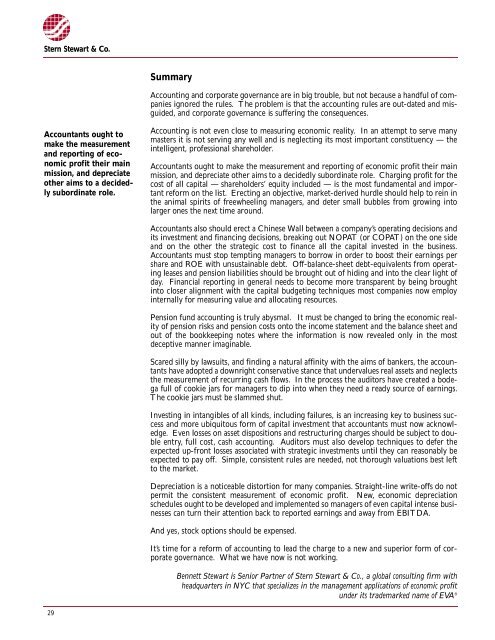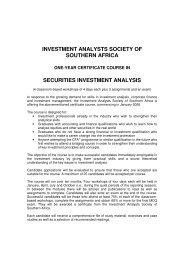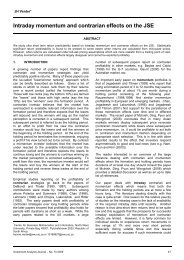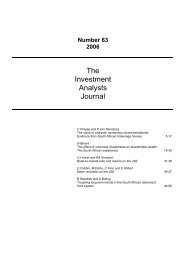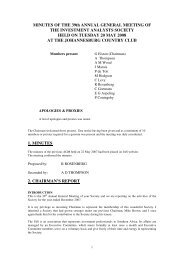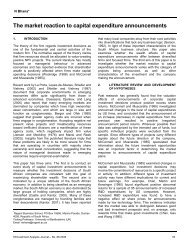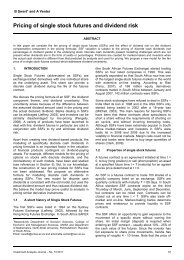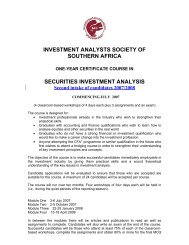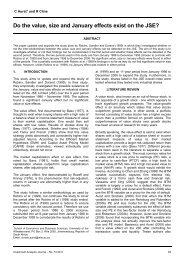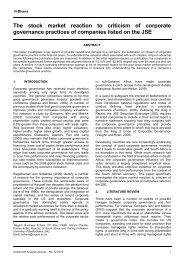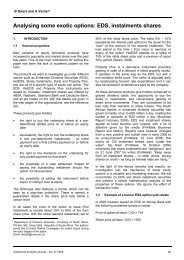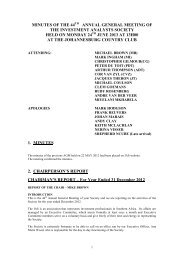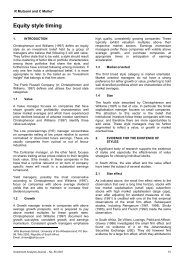Accounting is Broken - Investment Analysts Journal
Accounting is Broken - Investment Analysts Journal
Accounting is Broken - Investment Analysts Journal
Create successful ePaper yourself
Turn your PDF publications into a flip-book with our unique Google optimized e-Paper software.
Stern Stewart & Co.<br />
S u m m a ry<br />
<strong>Accounting</strong> and corporate governance are in big trouble, but not because a handful of companies<br />
ignored the rules. The problem <strong>is</strong> that the accounting rules are out-dated and m<strong>is</strong>guided,<br />
and corporate governance <strong>is</strong> suffering the consequences.<br />
Accountants ought to<br />
make the measure m e n t<br />
and re p o rting of economic<br />
profit their main<br />
m<strong>is</strong>sion, and depre c i a t e<br />
other aims to a decidedly<br />
subordinate ro l e .<br />
<strong>Accounting</strong> <strong>is</strong> not even close to measuring economic re a l i t y. In an attempt to serve many<br />
masters it <strong>is</strong> not serving any well and <strong>is</strong> neglecting its most important constituency — the<br />
intelligent, professional share h o l d e r.<br />
Accountants ought to make the measurement and re p o rting of economic profit their main<br />
m<strong>is</strong>sion, and depreciate other aims to a decidedly subordinate role. Charging profit for the<br />
cost of all capital — shareholders’ equity included — <strong>is</strong> the most fundamental and important<br />
re f o rm on the l<strong>is</strong>t. Erecting an objective, market-derived hurdle should help to rein in<br />
the animal spirits of freewheeling managers, and deter small bubbles from growing into<br />
l a rger ones the next time aro u n d .<br />
Accountants also should erect a Chinese Wall between a company’s operating dec<strong>is</strong>ions and<br />
its investment and financing dec<strong>is</strong>ions, breaking out NOPAT (or COPAT) on the one side<br />
and on the other the strategic cost to finance all the capital invested in the business.<br />
Accountants must stop tempting managers to borrow in order to boost their earnings per<br />
s h a re and ROE with unsustainable debt. Off-balance-sheet debt-equivalents from operating<br />
leases and pension liabilities should be brought out of hiding and into the clear light of<br />
d a y. Financial re p o rting in general needs to become more transparent by being bro u g h t<br />
into closer alignment with the capital budgeting techniques most companies now employ<br />
i n t e rnally for measuring value and allocating re s o u rces.<br />
Pension fund accounting <strong>is</strong> truly abysmal. It must be changed to bring the economic re a l-<br />
ity of pension r<strong>is</strong>ks and pension costs onto the income statement and the balance sheet and<br />
out of the bookkeeping notes where the information <strong>is</strong> now revealed only in the most<br />
deceptive manner imaginable.<br />
S c a red silly by lawsuits, and finding a natural affinity with the aims of bankers, the accountants<br />
have adopted a downright conservative stance that undervalues real assets and neglects<br />
the measurement of re c u rring cash flows. In the process the auditors have created a bodega<br />
full of cookie jars for managers to dip into when they need a ready source of earn i n g s .<br />
The cookie jars must be slammed shut.<br />
Investing in intangibles of all kinds, including failures, <strong>is</strong> an increasing key to business success<br />
and more ubiquitous form of capital investment that accountants must now acknowledge.<br />
Even losses on asset d<strong>is</strong>positions and re s t ructuring charges should be subject to double<br />
entry, full cost, cash accounting. Auditors must also develop techniques to defer the<br />
expected up-front losses associated with strategic investments until they can reasonably be<br />
expected to pay off. Simple, cons<strong>is</strong>tent rules are needed, not thorough valuations best left<br />
to the market.<br />
D e p reciation <strong>is</strong> a noticeable d<strong>is</strong>tortion for many companies. Straight-line write-offs do not<br />
p e rmit the cons<strong>is</strong>tent measurement of economic profit. New, economic depre c i a t i o n<br />
schedules ought to be developed and implemented so managers of even capital intense businesses<br />
can turn their attention back to re p o rted earnings and away from EBITDA.<br />
And yes, stock options should be expensed.<br />
I t ’s time for a re f o rm of accounting to lead the charge to a new and superior form of corporate<br />
governance. What we have now <strong>is</strong> not working.<br />
Bennett Stewart <strong>is</strong> Senior Partner of Stern Stewart & Co., a global consulting firm with<br />
headquarters in NYC that specializes in the management applications of economic profit<br />
under its trademarked name of EVA ®<br />
29


